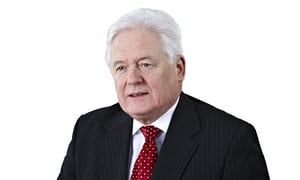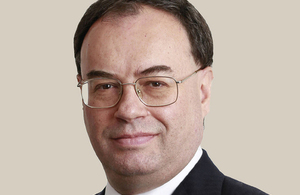Related Research Articles

The British Bankers' Association (BBA) was a trade association for the UK banking and financial services sector. From 1 July 2017, it was merged into UK Finance.

The London Institute of Banking & Finance is the oldest training and professional body for banking and financial services in England and Wales, and works internationally with partners to establish ethical and professional standards across the sector around the world.

Roger W. Ferguson Jr. is an American economist, attorney and corporate executive who served as the 17th vice chair of the Federal Reserve from 1999 to 2006. Prior to his term as vice chairman, Ferguson appointed as a member of the Federal Reserve Board of Governors since 1997. A member of the Democratic Party, Ferguson was the first African American to hold that post. After leaving the Fed, he served as president and CEO of the Teachers Insurance and Annuity Association of America (TIAA) from 2008 to 2021. Ferguson also appointed to board of directors of several companies.

John McFarlane OBE is a British businessman. He served as Group Chairman of Barclays from 2015 to 2019.
The Committee on Standards in Public Life (CSPL) is an advisory non-departmental public body of the United Kingdom Government, established by John Major in 1994 to advise the Prime Minister on ethical standards of public life. It promotes a code of conduct called the Seven Principles of Public Life, also known as the Nolan principles after the first chairman of the committee, Lord Nolan.

The Central Bank of the United Arab Emirates is the state institution responsible for managing the currency, monetary policy and banking regulation in the United Arab Emirates.
Sir Paul Tucker is a British economist, central banker, and author. He was formerly the Deputy Governor of the Bank of England, with responsibility for financial stability, and served on the Bank's Monetary Policy Committee from June 2002 until October 2013 and its interim and then full Financial Policy Committee from June 2011. In November 2012 he was turned down for the position of governor in favour of Mark Carney. In June 2013, Tucker announced that he would leave the Bank of England, and later that he would be moving to Harvard. He was knighted in the 2014 New Year Honours for services to central banking. His book, Unelected Power, was published in May 2018.

Anthony Howe Browne is a British politician who has been the Conservative Member of Parliament (MP) for South Cambridgeshire since the 2019 general election.
The Chartered Banker Institute was established in 1875 and is the oldest professional banking institute in the world and the only remaining banking institute in the UK. It aims to help rebuild public confidence in banks and bankers by developing and embedding high ethical, professional and technical standards. The institute offers a range of qualifications for banking and financial services.

Andrew John Bailey is a British central banker who has been Governor of the Bank of England since 16 March 2020.
The Financial Stability Board (FSB) is an international body that monitors and makes recommendations about the global financial system. It was established after the G20 London summit in April 2009 as a successor to the Financial Stability Forum (FSF). The Board includes all G20 major economies, FSF members, and the European Commission. Hosted and funded by the Bank for International Settlements, the board is based in Basel, Switzerland, and is established as not-for-profit association under Swiss law.

Gillian Tett is a British author and journalist at the Financial Times, where she is chair of the editorial board and editor-at-large, US. She has written about the financial instruments that were part of the cause of the financial crisis that started in the fourth quarter of 2007, such as CDOs, credit default swaps, SIVs, conduits, and SPVs. She became renowned for her early warning that a financial crisis was looming.

Andrew G. Haldane, FAcSS FRS is a British economist who worked at the Bank of England between 1989 and 2021 as the chief economist and executive director of monetary analysis and statistics. He resigned from the Bank of England in June 2021 to become chief executive of the Royal Society for Arts.
Promontory Financial Group, a wholly owned subsidiary of IBM, is a global consulting firm that advises clients on a variety of financial services matters, including regulatory issues, compliance, risk management, liquidity, restructuring, acquisitions, due diligence, internal investigations and cyber security.

Blythe Masters is a British former executive at JPMorgan Chase, where she was widely credited as the creator of the credit default swap as a financial instrument. She is founding partner of FinTech private equity firm Motive Partners, an advisory board member of the US Chamber of Digital Commerce, and a board member of A.P. Møller - Maersk, GCM Grosvenor, and Credit Suisse Group.

The Financial Conduct Authority (FCA) is a financial regulatory body in the United Kingdom, but operates independently of the UK Government, and is financed by charging fees to members of the financial services industry. The FCA regulates financial firms providing services to consumers and maintains the integrity of the financial markets in the United Kingdom.

The Single Supervisory Mechanism (SSM) is the first pillar of the European banking union and is the legislative and institutional framework that grants the European Central Bank (ECB) a leading supervisory role over banks in the EU. The ECB directly supervises the larger banks while it does it indirectly for the smaller ones. Eurozone countries are required to participate, while participation is voluntary for non-eurozone EU member states. In October 2020, two non-Eurozone countries joined the European banking supervision mechanism through a process known as close cooperation: Bulgaria and Croatia. As of early 2021, the SSM directly supervises 115 banks across the Union, representing almost 82% of banking assets of these countries. The SSM, along with the Single Resolution Mechanism are the two central components of the European banking union.
The Retail Banking Academy (RBA) is a UK-based educational body, founded with the objective of playing a leading role in the development and professionalisation of consumer-oriented retail banking around the world. It is the only educational and professional academy exclusively dedicated to retail banking anywhere in the world. The RBA is the only international, educational and professional body that's exclusively dedicated to retail banking.
Harriet-Ann Omobolanle (Bola) Adesola is the Senior Vice-Chairman at Standard Chartered Bank Group where she was previously the CEO of Standard Chartered Bank for Nigeria and West Africa. Adesola has over 25 years of experience in the banking sector.

Clive Christopher Roger Bannister is the chair of the Museum of London and the Chair Designate and Non Executive Director of Rathbone Brothers plc. He was a former insurance executive and banker.
References
- ↑ "Banking Commission publishes report on changing banking for good - News from Parliament". UK Parliament.
- ↑ "Banking Standards (Lambert Review)" (PDF).
- ↑ "Meet the board".
- ↑ "Dame Susan Rice appointed as Chair of the Banking Standards Board". 17 July 2019.
- 1 2 "Annual Review 2018/2019 Chairman's Foreword".
- ↑ "Annual Review 2018/2019 Explained". 1 April 2019.
- ↑ "Annual Review 2017/2018".
- ↑ "Annual Review Assessment Explained". 16 April 2018.
- ↑ "Annual Review 2016/2017".
- ↑ "Taking the measure of good corporate culture; Financial Times". Financial Times. 26 December 2018.
- ↑ "#AS2018 C Moore & Q Zaman, How the BSB assesses 'fuzzy' human behaviour & culture concepts at banks" – via www.youtube.com.
- ↑ (PDF) https://www.newyorkfed.org/medialibrary/media/governance-and-culture-reform/Summary-of-Workshop.pdf.
{{cite web}}: Missing or empty|title=(help) - ↑ "Gillian Tett asks if banking culture has really changed". 28 August 2018 – via www.ft.com.
- ↑ "City bankers battle with quandary of ethics versus career; Financial Times". Financial Times. 14 March 2017.
- 1 2 "A quarter of UK bankers say their job is bad for their health; Financial Times". Financial Times. 15 March 2018.
- ↑ "Knowledge-sharing workshop: Wellbeing and Resilience (Panel video: Qamar Zaman)". 18 July 2018.
- ↑ "Speaking up: small steps to big changes". FCA Insight. 23 July 2019.
- ↑ "Reports". Irish Banking Culture Board.
- ↑ "Banking Culture: The Path Ahead - FEDERAL RESERVE BANK of NEW YORK". www.newyorkfed.org.
- ↑ Kollewe, Julia (24 September 2019). "Lloyd's of London: nearly 500 workers suffered or saw sexual harassment in past year" – via www.theguardian.com.
- ↑ "Lloyd's reveals depth of sexual harassment culture". BBC News. 24 September 2019.
- ↑ "Work of the Banking Standards Board inquiry". UK Parliament.
- ↑ correspondent, Kalyeena Makortoff Banking (13 November 2018). "Overhaul of UK's poor banking culture is slow, admits standards chair" – via www.theguardian.com.